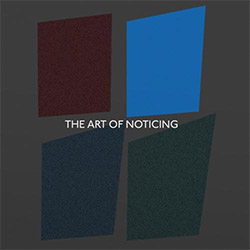
Eddie Prévost's 80th birthday was celebrated in July 2022 as a series of four concerts, each referencing important musical associations during his lifetime (Last Calls, intended to be an AMM trio event, turned out to be a Keith Rowe/Prévost duo, John Tilbury being unable to make the date for health reasons. The recording, with Tilbury adding a beautiful addendum from afar, is very much worth hearing). On July 16th, the performance at hand took place, with a quartet consisting of John Butcher (tenor and soprano saxophones), Marjolaine Charbin (piano), Ute Kanngiesser (cello) and Prévost (percussion). Violinist Jennifer Allum was also scheduled to perform but wasn't able to attend and is recognized in absentia.
One of the striking qualities that emerges from the first of the two lengthy improvisations heard here, something not always encountered in this area of music, is a strong sense of narrative, even drama. Nothing as overt as crescendi towards climaxes, of course, but a real sense of events leading to other events, passages being tied in to passages heard later on or referring to earlier sections. This, plus a real plasticity in the sounds themselves, gives the music an organicity or, as Harry Partch might have said, a corporeality that's rare and moving. A special mention should be made of pianist Charbin, new to these ears, who manages to strike a fine balance between (relatively) non-traditional approaches — inside-piano, percussiveness, etc. — and more tonal keyboard attacks, using a fine ear for when to deploy which, in what situation, always contributing sounds that are as imaginative as they are somehow appropriate. Butcher, Kanngiesser and Prévost (bowing cymbals) blend together so smoothly as to often render the combination wonderfully difficult, not to mention unnecessary, to parse. One would also have to mention the warmth and empathy felt throughout; Prévost has always foregrounded the communitarian spirit of his music and that comes across quite clearly in this performance.
The second set is somewhat more active on the surface, tilting a bit more toward a free jazz vein, especially during the first third or so of the performance, with Butcher's fluttering soprano, Kanngiesser's skittering bow work and some bubbling, upper register playing from Charbin. Prévost's bowed metal reins things in for the middle third, encouraging more probing, considered playing from all. There's a bit of back and forth, very slowly shifting between the softly, though delightfully sour, flowing and the emergence of somewhat more effusive eruptions from thenceforth. Again, Charbin's piano provides some surprising, though quite welcome recurring chords, comforting within the gently swirling sounds. The communication between musicians is human-reaffirming, generous while retaining individuality but only as assertive as called for by the moment.
As usual for Matchless releases, we get a fine, short text from Prévost and an excellent essay from David Grundy. A truly wonderful recording, as honest and vibrant as one could hope for and a fine testimony and representation of Prévost's ideas, influence and expansive personality.
Comments and Feedback:
|



